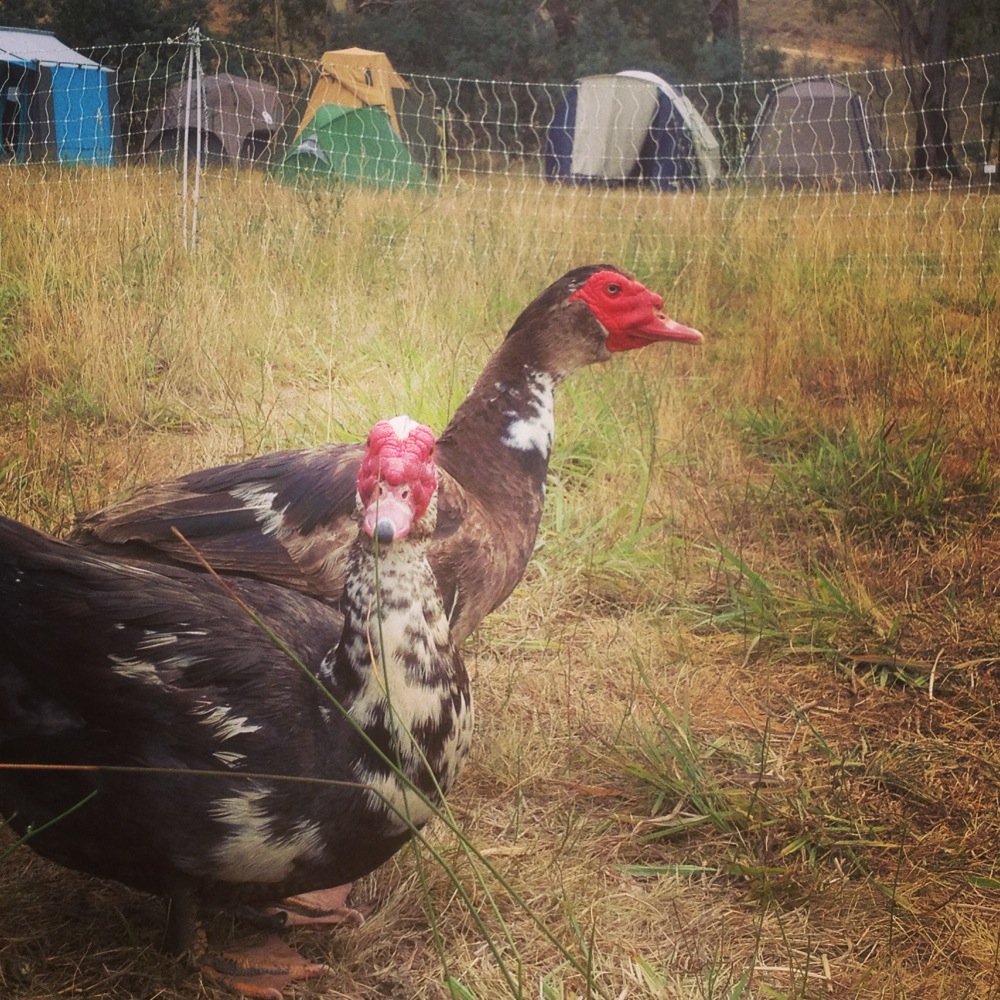
We’ve been wanting to introduce ducks to our integrated animal systems for some time now. We’ve been trying to decide which breed to start with and where they would best fit, so we can maximise the Power of Duck at Milkwood.
Random opportunity seems to have decided for us, for now. Friends down the road are moving on, and needed to find a home for their load of Muscovy ducks – 4 drakes, 4 ducks and a couple of clutches of ducklings. What a fantastic breed they are. They even perch to roost.
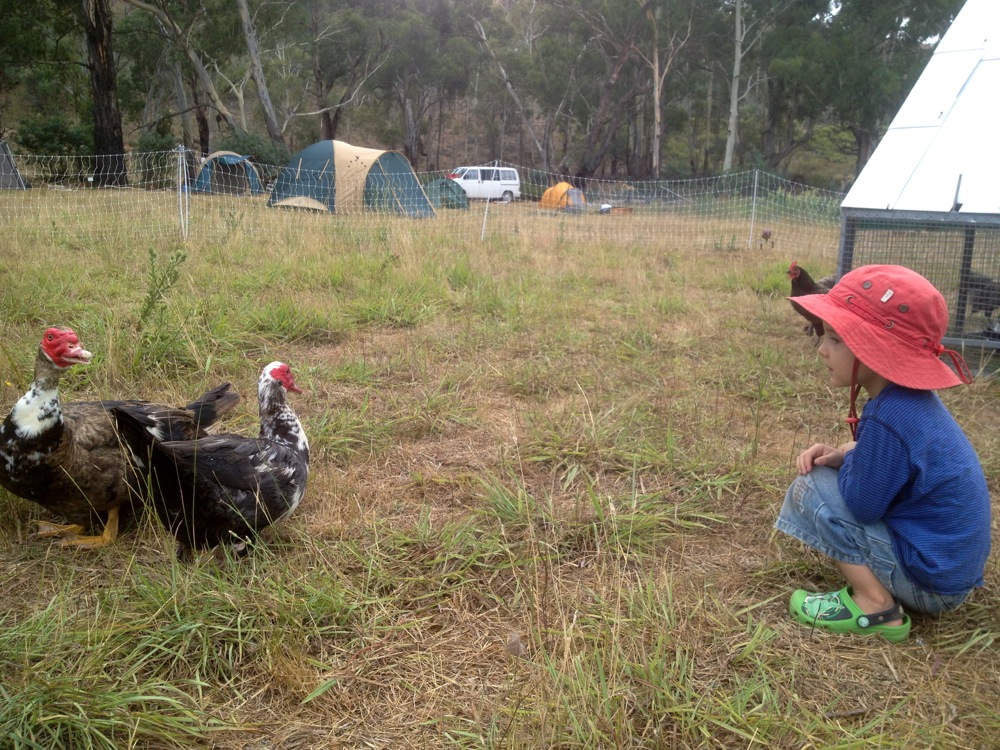
Ashar considering the power of duck x 2
After a bit of research as to the inclinations, functions and nature of the Muscovy, we’ve started them off down in our egg mobile system with the laying hens, until we decide on the design for a full-blown duck system design.
These particular muscovys had already been living with chickens, free ranging during the day and getting shut in the chicken run at night. So they’re comfortable with chickens, which is a good thing.
Also, as said above, adult muscovys perch to roost (as opposed to sleeping on the ground)… which makes them a fine compliment to chickens in an egg mobile, and also more resilient to predators.
The muscovys we’ve inherited are very chilled-out fellows. So far we’ve been delivered two drakes and a clutch of adolescent ducklings in the egg mobile system, and they’re all taking it in their stride.. a bit of foraging in the grass here, a bit of a waddle over there, and so it goes.
Adult Muscovys can fly if they have a mind to, so Floyd clipped the two Drakes wings to keep them where they are most useful to us (and easiest to protect from predators), inside the poultrynet fencing.
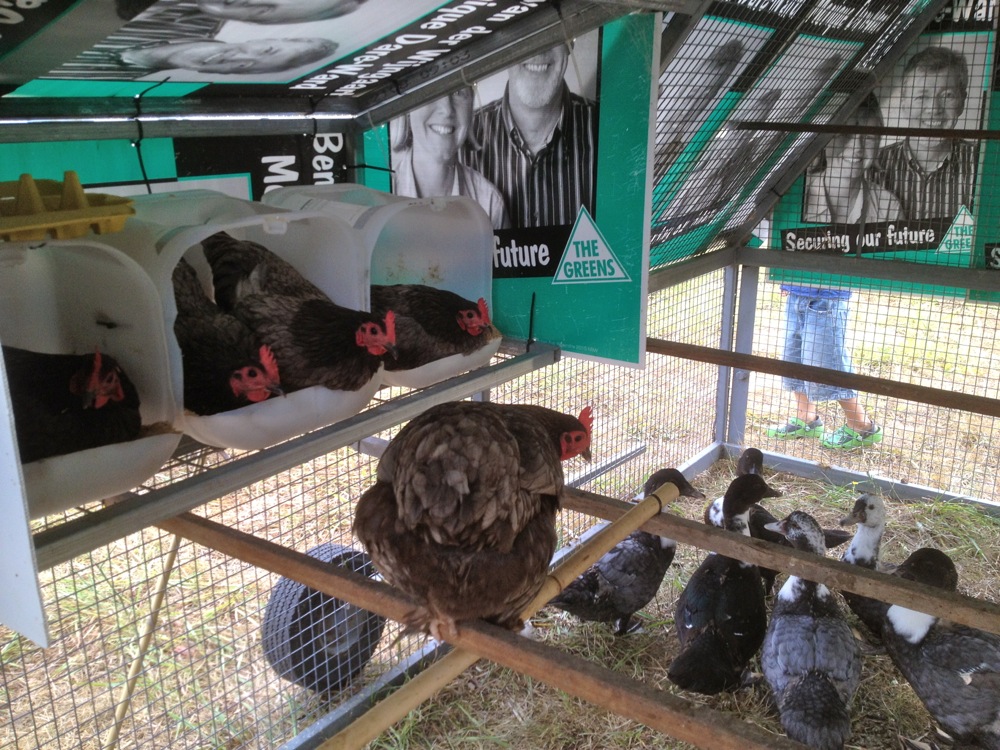
Blue langshan hens in the legg mobile laying boxes, considering the new strange chickens… (adolescent Muscovy Ducks)
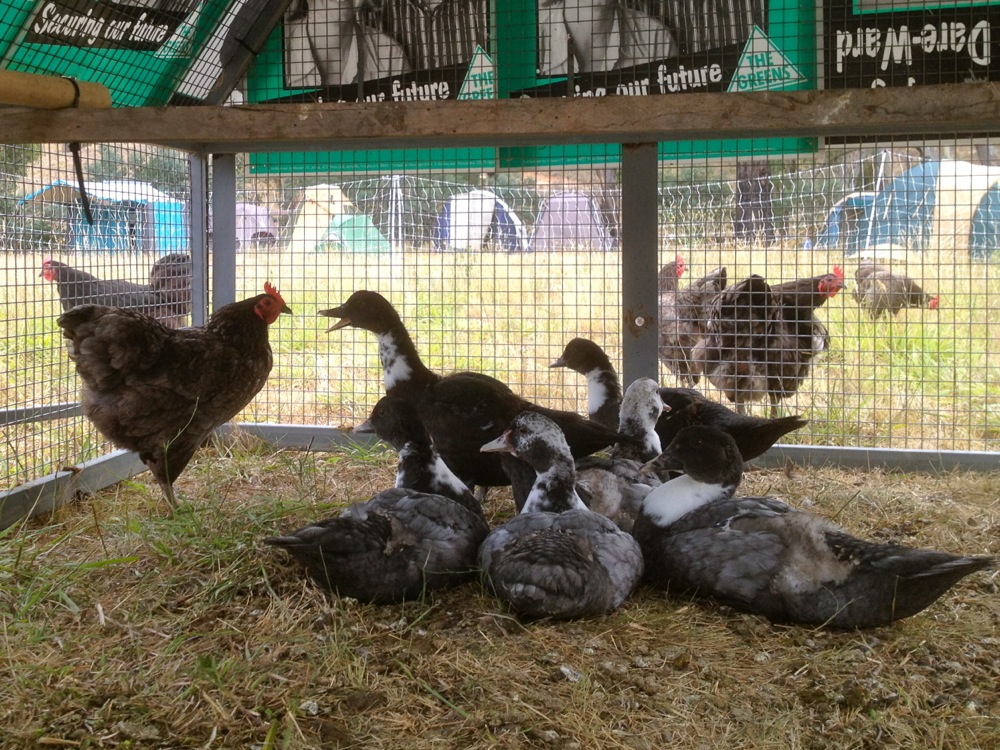
Muscovy ducks are traditionally bred as a meat bird, as they grow large, and quickly. When they do lay eggs, they go broody easily and make great mothers.
From the advice we’ve had from our networks, Muscovys are often raised in a small farm context as meat birds who are also great brooders and mums for the other duck breeds (like Khaki Campbells or Pekins) who are in turn very useful for their egg and/or meat production, but who don’t make such good mums.
Muscovy ducks are also native to South America. Yay for Gondwana ducks! There is some muddiness as to whether they are actually ducks or more closely related to geese than ducks, as they can (apparently) breed with some geese, though the resulting offspring are mules (ie infertile).
My best research so far says they are, infact, ducks. But who knows – it’s almost the Capybara all over again if you ask me (you know, those funky and massive South American aquatic rodents which look a bit like a hampster crossed with a wombat, and which a Pope in the 17th C classed as fish, because otherwise in some inland and very catholic parts of South America the table was somewhat empty during Lent… or so the story goes).
Anyway. Muscovy Ducks. At Milkwood. Are ducks, as far as we’re concerned (no Pope having been asked to adjudicate on this particular point).
Muscovys are also known as ‘quackless ducks’. They do hiss though. The are also prodigious producers of poop. Everywhere. Which, in a rotational pastured system, is a wonderful thing. Bring on the nutrient cycling.
All in all, we’re very happy with our windfall Muscovys. Their water requirements are not as high as other duck breeds (though we’ve given them a paddling pool in the interim) on a daily basis, though they do require water to mate.
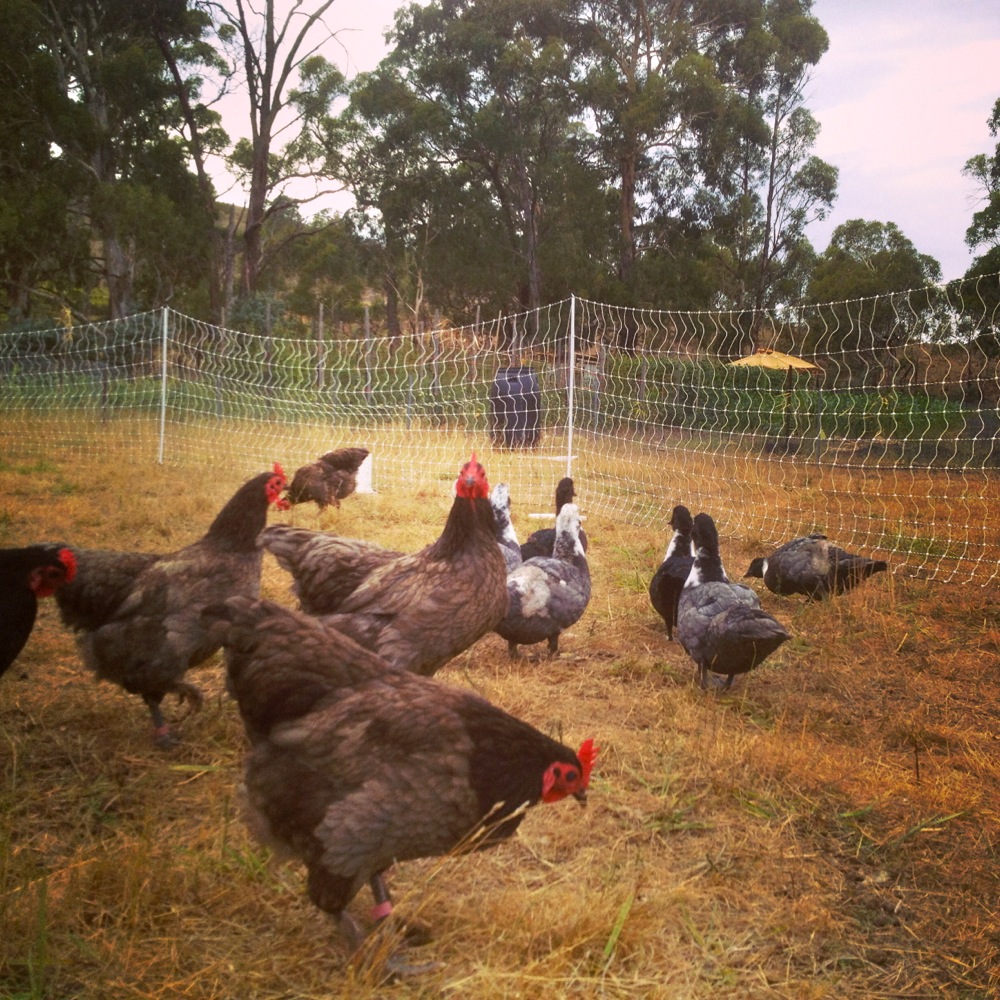
Multiple species in our pastured poultry system means more diversity of nutrient cycling and foraging…
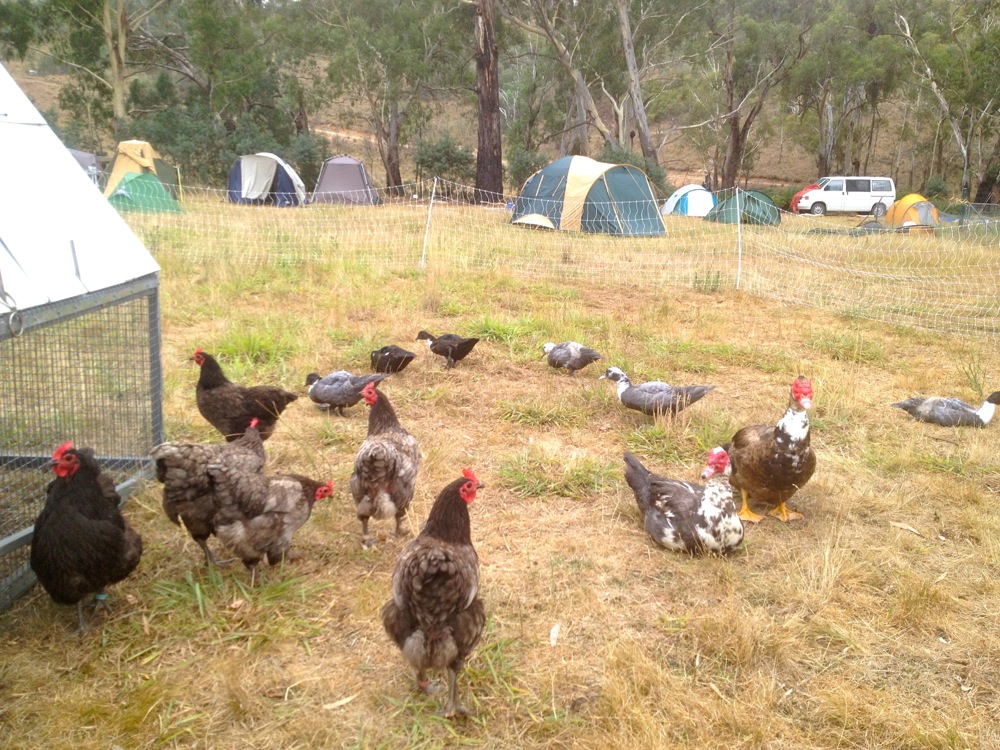 The design we’re going towards with ducks at Milkwood will probably center about setting up the ducks reasonably high in the landscape (perhaps in the forest garden) so that we can utilize their pond water for regular gravity-fed fertigation when we change their water.
The design we’re going towards with ducks at Milkwood will probably center about setting up the ducks reasonably high in the landscape (perhaps in the forest garden) so that we can utilize their pond water for regular gravity-fed fertigation when we change their water.
This kind of simple fertigation setup would be a great bonus to growth at our site with its limited water and nutrients, and will be a great way to heighten food security and abundance by turning an output into a valuable input. We’d also be calling apon the ducks for their slug and snail hunting abilities, as well as their ability to eat grass. And their meat, and their eggs.
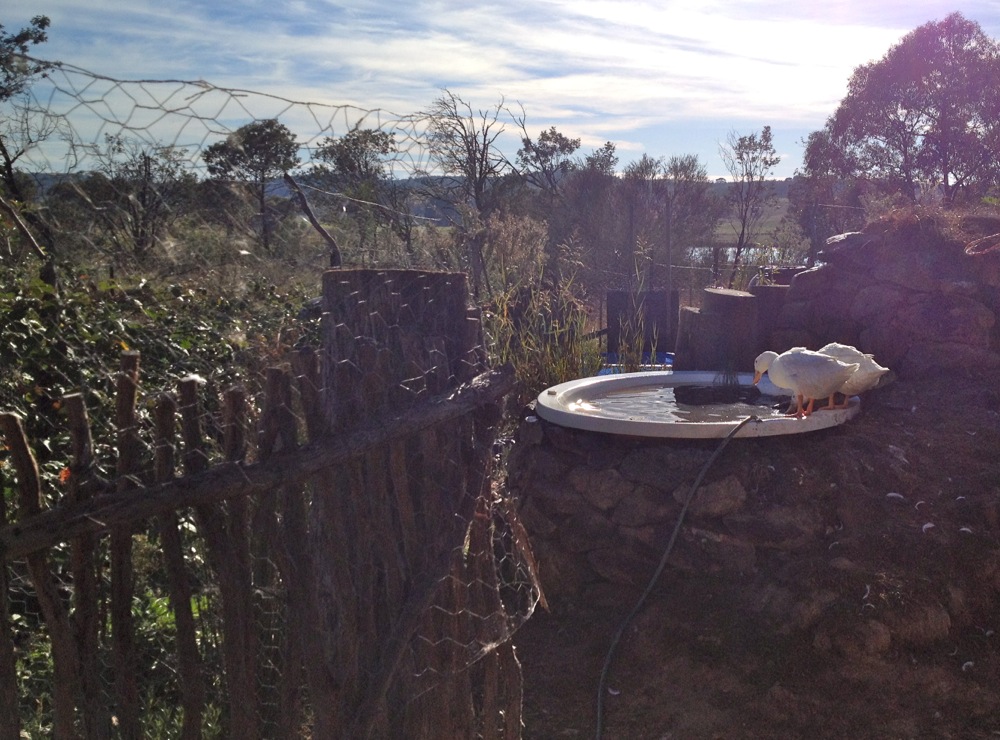
Cam and Jessie (Earth Integral)’s duck fertigation setup at their previous digs at Mulloon Creek – a simple siphon led from the duck’s pond to the lush temperate food forest just below
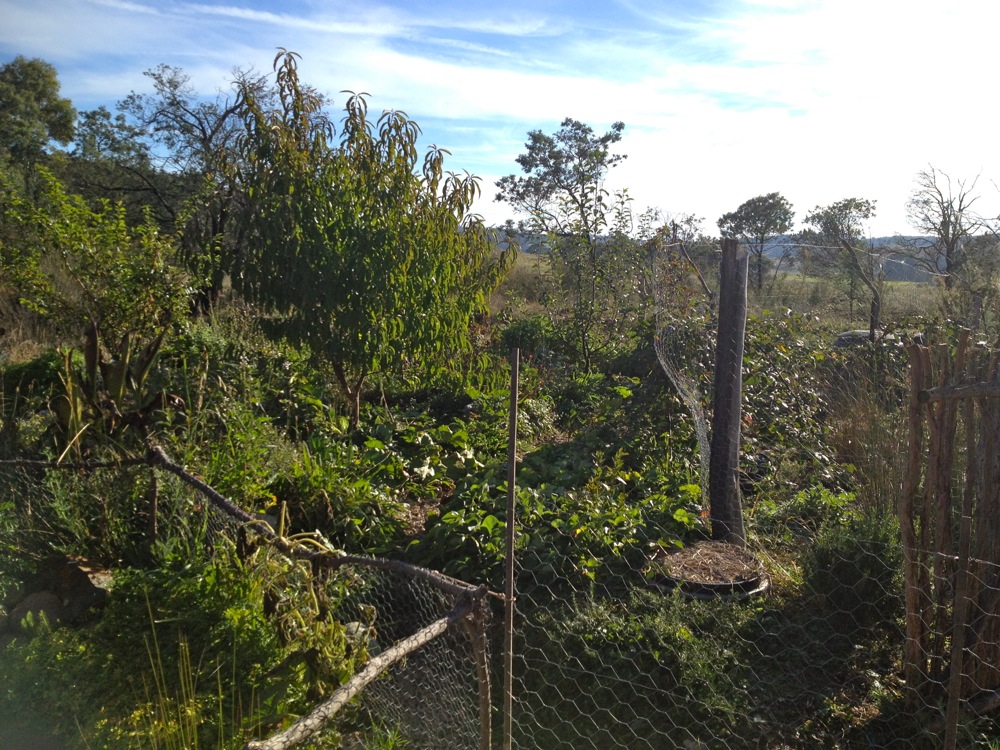
Cam + Jessie’s food forest below the duck enclosure… full of stability and food, thanks to good design and regular nutrient inputs.
Ideally, we’ll also have Khaki Campbell ducks in the mix, which I’m keen on for their excellent egg laying in all weathers… you cannot have too many duck eggs. Best. Scrambled eggs. Ever.
But for now, until the main integrated duck system is designed and built, the Muscovys are a good fit down in the egg mobile system, where they’re foraging and pooping happily.
Which should result, for the short term, in a low-input, nutrient-enhanced creek flat, and long term, in more Muscovy ducks…
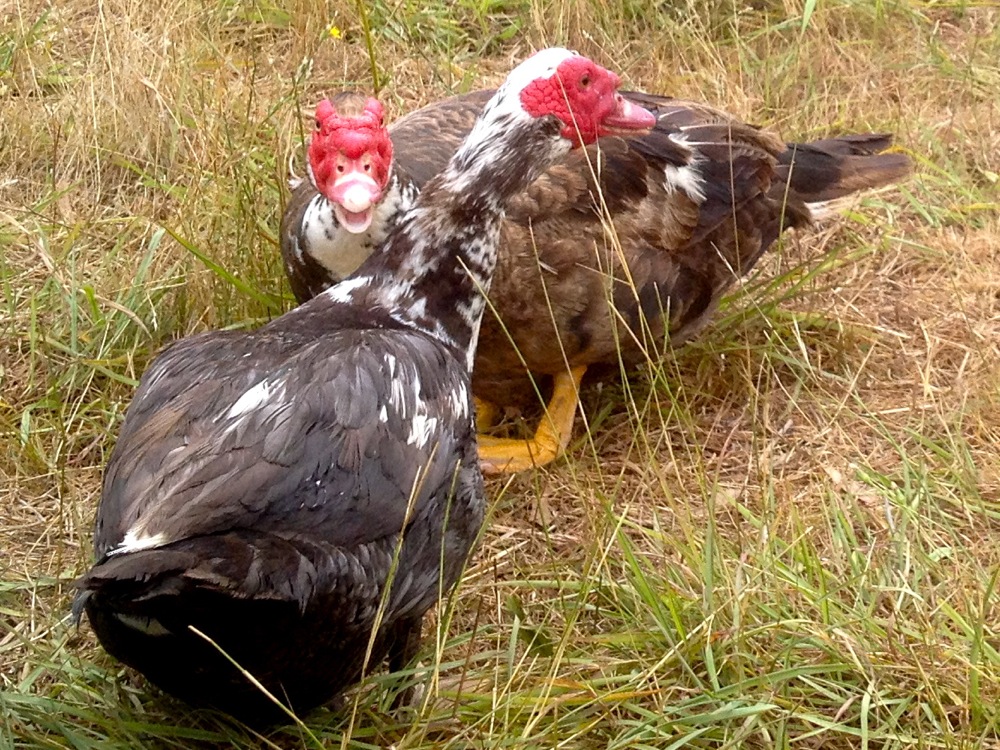
>> More articles about integrated animal systems for small farms…
Big thanks to Rachel and Chris for the Muscovys!





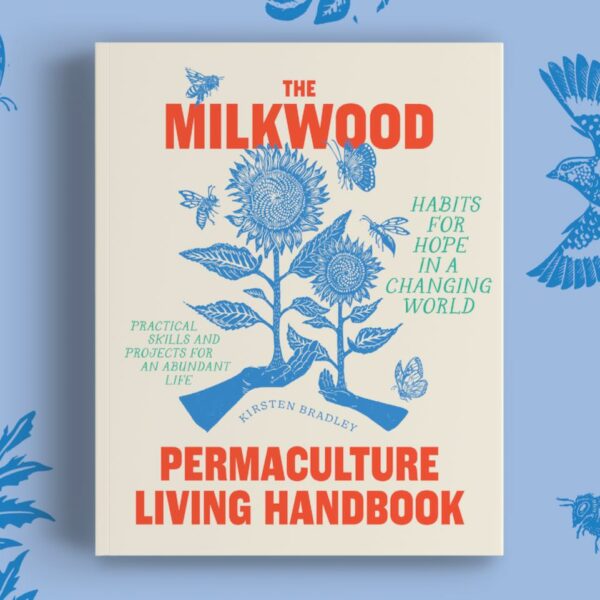
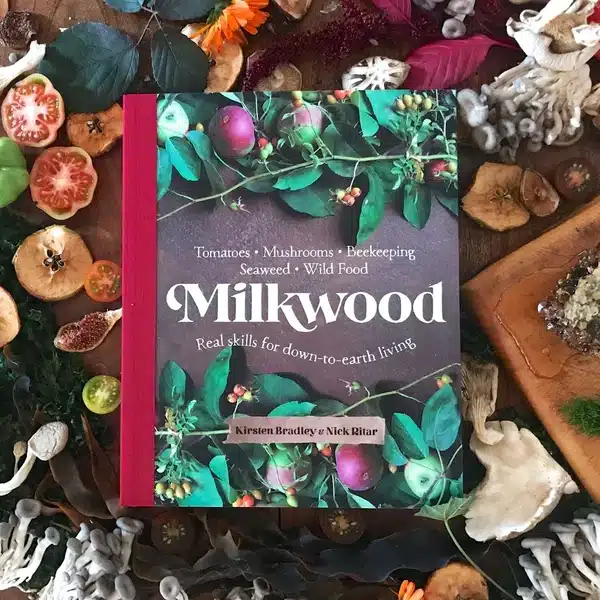






I used to keep & breed Muscovies. Do you know that they are not really a “duck”, but a variety of goose. They can only breed with other muscovies to propagate the species … if bred with other breeds of duck they produce “mules” which then cannot breed & lay a very small immature egg. Had some once: I had no drakes of any variety, at the time, so she apparently mated with a wild duck! The babies grew into very pretty ducks, who laid eggs like bantam chooks … the eggs were quite edible (as were the male offspring,… Read more »
Love the beak to beak picture! Also the story about the Catholic fish/duck classification. Fertigation, now there’s a word. What a great idea about the duck waterhole being above the food forest garden to take advantage of gravity. One of those many “aha” moments of permaculture, I guess.
I’ve got 3 types of ducks, and am having a hard time picking my favourite. The pekins lay big eggs and lots of them, the muscovies forage well and are tasty, and the Indian runners lay well and look so cool.
I’m currently on the lookout for bathtubs to turn into duck pools.
I had to laugh at the reused election posters on your chook tractor roof – Ben and Monique are both friends of ours! I’m sure both would be super-proud to be sheltering your poultry with their smiling faces :-).
Thank you for sharing this information. Quite wonderful.
Looks to be all happy with ducks in the chook run!
Make sure you keep the water up to the ducks.
Kirsten, chooks will suffer if they don’t have their own clean water source because they do not like drinking from duck muddied water holes.
Chickens are the babies of chooks. Once they have grown up they become pullets, chooks etc. It is only the Americans who seem to try to instill in us that they are still chickens when really they have grown up.
Not entirelt true, Jim. I know the Bris refer to adults as ‘chickens’ too. When I was over there & referred to chooks, they didn’t know what the heck I was talking about … and usually laughed at the word “chooks”! Afterall, WE Aussies also refer to eating ‘Roast Chicken’ & other ‘chicken’ dishes … and it’s not that we eat the babies, do we?
Sorry, “Bris”, in my previous comment, should be ‘Brits’ (British!).
We’ve got 3 Muscovies too and they are so lovely. Milly, Molly and Mandy we’re bought for meat but have since become a little girls pet so I am eagerly awaiting eggs. Mandy is about 20 weeks so hoping she lays soon. The other 2 are much younger but Milly is growing a lot faster so I’m wondering if maybe she is a Mike instead. Time will tell. 🙂
Muscovys! I love their bantering habits and they do a great job on the slugs and snails. I also recall the yearlings expeditionary flying sessions into adjoining yards and even on top of neighbour’s chimneys. I never could eat their eggs but then I wasn’t into cakes and I don’t think I tried the scrambled option. Khaki female gave the Muscovy females considerable bother in my experience but respected the Muscovy male. I hope I get to see your Muscovys one day!
I have raised moscovys for years in cincinnati ohio. They are the duck that never goes away!!! Every late spring I loose about half my flock of hens then later in the summer they come back with about a dozen ducklings each. The males go where the food is. I keep the females for several years but only keep males for two years max. The younger males breed without water. We hatch alot of poultry but I have never had to hatched a moscovy
Hi, I have read that Muscovies are related to the swan family. We have 1 female Muscovy ( Louise )and 1 Khaki Campbell ( Doug) drake and we breed them to get a good sized meat bird and a better layer of eggs. She wasn’t a good mum first time round but she has come good. Please watch out for the drakes as I have known them to kill the young, if all in the same sleeping place. I too love the “Mussies” temperment, almost like a dogs and as soon as she sees a shovel come out, shes right… Read more »
We had a few windfall muscovies. Presently I only have 2 lovely lady pensioners eggs are rare but are beautiful. Please note do not wear thongs around them. The will attack when they hear them slapping. I tripped in the bckyard one day and was held down by the male till my partner came slip slapping into the yard at my cries for help, only to be the next object of the attack.
We ended up with two muscovies after a moment of weakness at the local farmers market and the pester power of our two boys, and we have not regretted it one bit. They coexist with the chooks really well, but have never seen them roost. Just need to watch the water quality as they muddy drinking water really quickly. Plenty of eggs, great mothers and we’ve used them to hatch other breeds over the past year. So impressed we’ve just swapped some of our other ducklings for our first muscovy drake…
We had Muscovys and loved them. It was wonderful to see them going for their am fly-by, as they like to circle the house and barn every morning just after sun up. Unfortunately, our free-range flock was wiped out by a coyote two winters ago. I wish you much better luck.
They are great producers of rich eggs, which will make your baked goods quite lovely. If you raise them for meat, I suggest not letting them get older than about 6 or 7 months, as after that they get pretty tough.
have a male muscovy who wont leave my mallards alone…and the mallards are afraid of him how do i get him to leave them alone??? my guess was find him a female!!!!….
maybe… or eat him?
The antics of the ducklings cavorting in a pond is well worth setting up. We had 2 hatch-lings brought into our wildlife hospital and unable to identify them at the hatch-ling stage put them in a pen of their own with a kiddies swimming pool. My volunteers would love to change the water at the end of their shift and sit for awhile watching the antics as they swam crazily thru the water. Faerie penguins flying choreography is as close as I’ve seen in any other birds. They mated, hatched many broods and were eventually traded to a farm in… Read more »
Hi Kirsten,
Allsun Farm wrote on their website that the masterfence (large mesh) isn’t best suited for ducks… How do your ducks and ducklings behave with your feathernet? All the best, Lexxie
wonderful post. Just started a little researching for the outcome of our happily breeding, multiplying like catholics, ducks. The plan is for them to follow our relatively small herd of 20 plus cows. Do you have any suggestions as… it’s been awhile since you’ve written this… maybe some more juicy insight could be given. Thanks! i can be reached at hamsa.i108@gmail.com